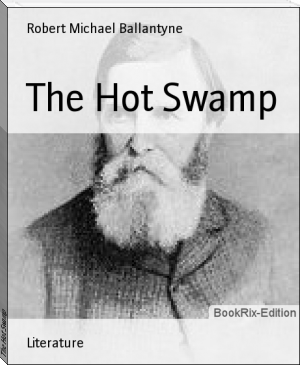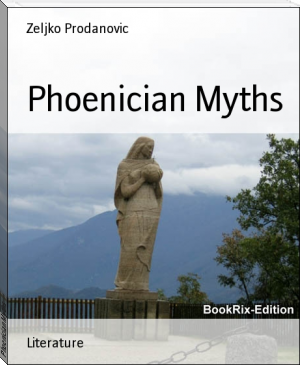The Hot Swamp, Robert Michael Ballantyne [types of ebook readers txt] 📗

- Author: Robert Michael Ballantyne
Book online «The Hot Swamp, Robert Michael Ballantyne [types of ebook readers txt] 📗». Author Robert Michael Ballantyne
"Who goes there?" demanded the prince.
"Your mother. Let me in, Bladud."
"I may not do so just now, dear mother. Tomorrow you shall know all. Rest content. I feel better."
In the dead of night Bladud went out softly and sought the hut where Captain Arkal and Maikar slept. He found them conversing in great sorrow about the terrible calamity that had overtaken their friend when he entered. They started up in surprise to receive him.
"Keep off," he said, shrinking back. "Touch me not! I know not whether the disease may not be catching even at its present stage. Sit down. I will stand here and tell you what I want you to tell my mother in the morning."
The two men silently obeyed, and the prince continued.
"I am on the point of leaving home--it may be for ever. The Disposer of all things knows that. The disease, as you know, is thought to be incurable. If so, I shall die where no one shall find me. If health returns I shall come back. It will be of no use to search for me; but I think that will not be attempted. Indeed, I know that my father would be compelled to banish me if I wished to remain at home. It is partly to spare him the pain of doing so that I banish myself of my own accord; and partly to avoid leaving infection behind me that I go without farewell. Let my dear mother and sister understand this clearly--and-- comfort them if you can."
"But where will you go to and what will you do?" asked the captain anxiously.
"That I do not yet know. The forests are wide. There is plenty of room for man and beast. This only will I reveal to you. To-night I shall call at the hut of Beniah the Hebrew. He is a wise man and will advise me. If I send news of myself it shall be through him. But tell not this to any one. It would only bring trouble on the old man. Farewell, my comrades. I will remember you as brothers--always. May the All-powerful One watch over us."
Unable to restrain himself, little Maikar sprang up with the obvious intention of rushing at his friend and seizing his hand, but the prince stepped back, shut the door against him, and, in another moment, was gone.
CHAPTER FIFTEEN.
AN EAVESDROPPER IN THE CAVE.
An hour later Beniah the Hebrew, who had been obliged to postpone for a time his journey to the North, was startled by hearing footsteps approaching his hut in the dell. It was so unusual an event at that hour of the night, that he arose quickly and grasped the six-foot staff which was his only weapon.
At a much earlier hour Branwen had retired to rest in the inner cave, and was buried in that profound sleep which proverbially accompanies innocence and youth. The noise in the outer cave partially aroused her, but, turning on her other side with a profound sigh, she prepared for a little more of the perquisites of innocence and youth. Presently she was startled into a condition of absolute wide-awakeness by the sound of a well-known voice, but it suddenly changed into that of the Hebrew.
"I've dreamt it, I suppose," she muttered, in a tone of regret; nevertheless, she listened.
"Come in," said Beniah, evidently to some one outside of his door.
"I may not enter--I am a leper," answered the first voice; and Branwen sat up, with her great beautiful eyes opened to the utmost, and listening intently, though she could not make out clearly what was said.
"It matters not; I have no fear. Come in. What! Prince Bladud!" exclaimed Beniah in astonishment as our hero entered.
"Even so. But how is it that you know me?"
"I saw you once, and, once seen, you are not easily forgotten. But what mean ye about being a leper?"
"Keep at a safe distance, and I will tell you."
Hereupon the prince began to give the old man an account of his illness; the opinion expressed by the doctor as to its nature; and the determination he had formed of forsaking home, and retiring to the solitude of some unfrequented part of the forest for the remainder of his life.
It would have been a sight worth looking at--had there been light to see it--the vision of Branwen, as she stood in the passage in partial _deshabille_, with her eyes wide, her lips parted, her heart beating, and a wealth of auburn hair curling down her back, listening, as it were, with every power of her soul and body. But she could not hear distinctly. Only a disconnected word reached her now and then. In a state of desperate curiosity she returned to her cave.
A few minutes later a noise was heard by the two men in the outer cave; and a little old woman in a grey shawl was seen to thrust a plank over the chasm and totter across towards them.
Poor Beniah was horrified. He did not know what to do or say. Happily he was one of those men whose feelings are never betrayed by their faces.
The old woman hobbled forward and sat down on a stool close to them. Looking up in their faces, she smiled and nodded.
In doing so she revealed the fact that, besides having contorted her face into an unrecognisable shape, she had soiled it in several places with streaks of charcoal and earth.
"Who is this?" asked Bladud in surprise. Before the old man could reply, the old woman put her hand to her ear, and, looking up in the prince's face, shouted, in tones that were so unlike to her own natural voice that Beniah could scarce believe his ears--
"What say you, young man? Speak out; I'm very deaf."
With a benignant smile Bladud said that he had merely asked who she was.
"Haven't you got eyes, young man? Don't you see that I'm a little old woman?"
"I see that," returned the prince, with a good-humoured laugh; "and I fear you're a deaf old woman, too."
"Eh?" she said, advancing her head, with her hand up at the ear.
"You seem indeed to be extremely deaf," shouted the prince.
"What does he say?" demanded the old woman, turning to the Hebrew.
By this time Beniah had recovered his self-possession. Perceiving that the maiden was bent on carrying out her _role_, and that he might as well help her, he put his mouth close to her ear, and shouted in a voice that bid fair to render her absolutely deaf--
"He says he thinks you are extremely deaf; so I think you had better hold your tongue and let us go on with our conversation."
"Deaf, indeed!" returned the woman in a querulous tone; "so I am, though I hear you well enough when you shout like that. Perhaps he'll be as deaf as I am when he's as old. There's nothing like youth for pride and impudence. But go on, never mind me."
"She's a poor creature who has sought refuge with me from her persecutors," said Beniah, turning to the prince, while the old woman fell to crooning a wild song in a low voice, accompanying the music--if such it may be called--by a swaying motion of her body to and fro.
Seeing that she meant to sit there, and that she apparently heard nothing, Bladud resumed the conversation where it had been interrupted.
"Now, as I was saying, you know the country in all directions, and can tell me of the most likely part where I can find what I want--a solitude where I shall be able to escape from the face of man, and build a hut to live in till I die. It may be long, it may be short, before death relieves me. Meanwhile, I can hunt and provide myself with food till the time comes."
The crooning of the old woman stopped at this point, and she sank her face on her hands as if she had fallen asleep.
"I know of a man--a hunter," said Beniah, "a wild sort of being, who lives a long way from here, in a beautiful part of the land, where there is a wonderful swamp with a hot spring in the midst of it. Besides hunting, the man who lives there cultivates the ground a little, and keeps a few cattle and pigs. It may be that he can put you in the way of finding what you want; and you need not tell him about your disease, for you are not yet sure about it. Thus you will have an opportunity of keeping out of the way of men until you find out whether the doctor is right about it. He may be wrong, you know. Diseases sometimes resemble each other without being the same."
Bladud shook his head.
"There can be no doubt that I am doomed," he said. "I know the disease too well."
The Hebrew also believed that, if the doctor was right in his opinion, there was no hope for the youth. Being unwilling, however, to dwell upon this point, he asked--
"How did you come by it?"
"Very simply," answered the prince, who thereupon entered into a graphic account of the incident which we have already recorded. Having done so, he made up his mind, after some further talk, to pay a visit to the hunter who dwelt in the region of the Hot Swamp.
"But you will not surely go without arms?" said Beniah.
"Why not? If I am doomed to die at any rate, why should I take the life of any man to save my own?"
"Let me at least give you a bow and a sheaf of arrows. You cannot procure food without these."
"Well, you are right. I will accept your kind offer. To say truth, my heart was so crushed at first by this blow, that such matters did not occur to me when I left; for it is terrible to think of having to die of a slow disease without father, mother, or sister to comfort one!"
"It is indeed, my son," returned Beniah with much feeling. "If you will accept it, I can give you a word of comfort."
"Give it me," said Bladud; "for I need it much,--if it be but true."
"It is true," returned the Hebrew earnestly; "for in one of the books of our holy men who spoke for the All-Father, it is written, `When my father and my mother forsake me, then the Lord will take me up.'"
"It is a good word," returned the prince; "and I can well believe it comes from the All-Father, for is He not also All-Good? Yet I can scarcely claim it as mine, for my father and mother have not forsaken me, but I them."
A few minutes more, and Bladud rose to depart. He took the bow and arrows in his left hand,





Comments (0)